
Components
The Map
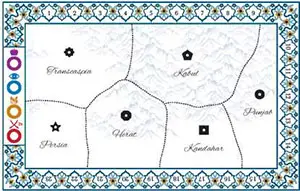
The map consists of six regions. There is no limit to the number of pieces that can be placed on a specific region or border, and pieces belonging to different players and coalitions can occupy the same region or border. The map is bordered by a victory point track and spaces to mark the favored suit.
Coalition Blocks
Each coalition has twelve blocks in its color. What a block represents depends on where it is placed. A block placed in a region is called an army. If placed on a border, the block is called a road (it helps to set roads on their side to make them stand out at a glance).

In general, coalition blocks only help players who are currently loyal to that coalition. So, even if you helped raise the army, your soldiers will not follow you if you change your loyalty.
Cylinders
Each player has eleven cylinders in their color. The cylinder with the gold design is used to track victory points. The remaining cylinders represent different things based on where they are placed.

A cylinder placed in a region is called a tribe. If placed on a card in a player's court, the cylinder is called a spy. Unlike coalition pieces, cylinders will always be on your side, even if you change loyalty.
Money Supply
There are 36 coins in the game. Each is worth a single rupee. Unlike other components in the game, there is no hard limit to the number of coins, but it is very rare to need additional coins.
In Pax Pamir, rupees represent political capital. During this time, political capital was largely a zero sum game, and that is true as well in Pax Pamir.
Other Pieces
A variety of other playing pieces perform various func- tions throughout the game, including ruler tokens, play- er boards, loyalty dials, and the favored suit marker.
Cards

There are three types of cards in Pax Pamir: event cards (16), court cards (100), and Wakhan cards (24 AI and 2 aid).
Event cards are fairly straightforward. Each has two effects. The bottom effect is triggered if it is purchased by a player. The top effect is triggered if the card is automatically discarded during the cleanup phase at the end of a player's turn.
Players should note that four of these event cards feature the same picture of the throne room of the Bala Hissar; these are special event cards called Dominance Checks that determine when and how victory points are awarded.
The vast majority of the cards in the game are called court cards. Court cards hold a lot of information and understanding them is critical to playing Pax Pamir. Their anatomy is described below.
Wakhan AI cards are used only when playing with Wakhan. Wakhan aid cards are used to store his gifts and provide reminders about important rules.
Core Anatomy
All court cards have these features.

Advanced Anatomy
Some court cards have these features.

Patriots
Some court cards hold strong opinions.

Wakhan Cards
Ignore these cards unless you are playing with Wakhan.
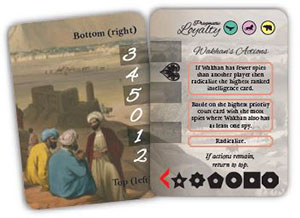
Key Terms and Concepts
The Four Suits
The vast majority of the cards in Pax Pamir are divided into four suits that each correspond to a different mode of power: economic, military, political, and intelligence. Each suit has its own advantages. Generally speaking...

The economic suit controls the flow of rupees and the movement of pieces. It also protects wealth from taxation in the game.
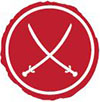
The military suit commands armies and helps secure a coalition's dominance.
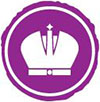
The political suit consolidates power and controls which cards are able to be played.

The intelligence suit grants diplomatic flexibility and the ability to compromise enemies.
The Favored Suit
One suit is always considered favored. This suit determines which cards take bonus actions and may make cards more expensive.
The favored suit changes when certain cards are played.
Your Court
Each player is associated with a single row of cards called a court. Players begin the game with- out any cards in their court, but will gradually add cards to and remove cards from their court over the course of the game.
Cards in a court cannot be freely rearranged. While your court can grow to any size during your turn, during cleanup you must discard cards from your court so that you do not have more court cards than three plus the sum of purple stars on cards in your court.
Your Hand
Each player is associated with a hand of cards. While your hand can grow to any size during your turn, during cleanup you must discard cards from your hand so that you do not have more hand cards than two plus the sum of blue stars on cards in your court.
Rank And Privilege
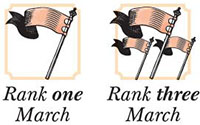
Each court card has a rank from one to three stars. Rank has two important consequences.
First, a card's rank determines the strength of some of its actions. These actions feature additional symbols to help players remember which actions depend on rank.
Second, a card's rank is also added to your total stars in a specific suit. Each sum of stars in a suit expands an important privilege, as indicated here:

Economic Stars prevent your rupees from being taxed.

Military Stars serve as a final score tie-breaker.

Political Stars enable you to maintain a larger court.

Intelligence Stars allow you to hold more cards in your hand.
Loyalty and Influence
Players in Pax Pamir are always loyal to one of three coalitions: British (pink), Russian (yellow), or Afghan (green). Your loyalty determines the color of coalition blocks which you will place when playing cards e.g. players loyal to the Russian coalition place blocks that are yellow.
The extent of your loyalty to a coalition is measured in influence points. We'll get to the various ways you'll acquire these things later, but, for now, know that your total influence is the sum of one plus the number of patriots in your court, the number of your prizes, and the number of your gifts.
To change your loyalty, you must gain an influence point associated with a different coalition than your own (either by playing patriots or by betraying cards with prizes).
Whenever you change loyalty, first return your \ gifts to your supply and discard any prizes and patriots you had previously accumulated. Finally, adjust your loyalty dial to indicate your new loyalty.
Ruling a Region
Each of the six regions in the game is associated with a ruler token. Ruler tokens remain on the board if no player currently rules the region.
If a player does rule a region, they should immediately take the associated ruler token and place it in their play area. Likewise, if a player ceases ruling a region, the associated ruler token should be immediately returned to the board.
In order to take a ruler token, you must have at least one tribe and a plurality of ruling pieces (more than all others individually). Tribes and loyal armies are considered ruling pieces. If there is a tie, no player rules the region. Armies belonging to enemy coalitions can prevent you from taking a ruler token, even if there are no enemy tribes.
Ruling a region grants players access to the build action, special taxing privileges (page 13), and the ability to extract bribes from other players who want to play cards associated with that region. It's good to be king.
Example: You have three ruling pieces in Kandahar (one tribe and two Afghan armies loyal to you). There are also four additional armies not loyal to you (two British, two Russian). Because you have at least one tribe in the region and the most ruling pieces, you take the ruler token.
General Rules
Negotiation
Players are free to discuss the game during play and explicitly coordinate their actions. Howev- er, any agreed-upon deal should be considered non-binding. Cards may never be transferred be- tween players.
Money can only be transferred from one player to another if explicitly sanctioned by the rules e.g. taxation of subjects, bribes for taking hostage actions, playing cards.
Component Limits
If asked to place a unit and none remain in the supply, you must take a piece of the required shape/color from anywhere in play, excluding any pieces placed this turn. In taking and placing a piece this way, you may convert one type of unit to another.
Example: You must place a spy, but you have no cylinders remaining in your stock, so you take one of your tribes in play and place it as a spy as instructed.
Card Precedence and Special Abilities
Some event cards and court cards with special abilities will modify the rules of the game. These cards always take precedence over the rules. If a court card has a special ability, it is active as long as the card remains in your court.
Access to Actions
You always have access to the following core actions: purchase and play. In addition, the cards in your court provide you access to the actions listed on that card.
Each card in your court can only be used for one action per turn. That is, even if a card has three actions on it, only one of those actions can be used each turn.
Discarding a card in your Court
Whenever a card in your court is discarded, the following rules always take effect:

Any spies on the card are lost and returned to their owner's supply.
If the card had the leveraged icon, you must return two rupees to the supply. For each rupee you cannot return, you must discard one card from your hand or court (not including this card, of course). If you have no cards left, no further payment is required.
The Overthrow Rule

In general, there is no persistent link between the cards in your court and the pieces on the map. However, if you lose your last tribe in a region, you must immediately discard all political cards associated with that region from your court.
Likewise, if you lose the last political card in your court associated with a region, you must immediately remove all of your tribes in that region.
Many games will be won and lost because of this rule, so you may want to read it again just to make sure you've got it!
Continue Reading
